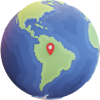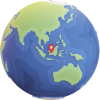Case studies are organised by region, with each region featuring links to the countries where the case studies are located.
Brazil

Brazilian federal authorities launched an investigation into a money laundering network suspected of moving millions of dollars’ worth of illicit gold in 2023. Through a network of shell companies, individuals are alleged to have moved money linked to gold illegally sourced from Brazil’s northern neighbor Guyana. In one instance, a shell company purportedly to be trading hospital supplies was alleged to have laundered over $12.3 million in gold. Shell companies play an important role in Brazil’s illicit gold industry, with these companies providing a way for criminals to issue invoices without a physical address to hide the illegal origin of exported gold. Authorities have estimated that over 30 tonnes of gold is illegally extracted each year from the Brazilian Amazon, with this illicit practice exploiting low-earning miners in areas of poor human and economic development, causing considerable deforestation and socio-economic harm.
Keywords: Latin America, Brazil, minerals, gold, primary production, deforestation, illegal mining
Source: https://www.occrp.org/en/daily/17831-brazil-launches-investigation-into-r-80-million-in-illegal-gold

In Pará, Brazil’s largest palm oil-producing region, violence, land grabbing, and forced evictions of Indigenous, Quilombola, riverine, and campesino communities have been escalating since early 2022. Local leaders allege that government officials have encouraged palm oil producers to suppress any opposition violently. Two major palm oil companies are at the centre of these conflicts. Brasil Biofuels (BBF) is accused of using violence and intimidation against Indigenous and traditional communities. BBF allegedly employs armed security to intimidate and forcibly remove community members from their lands, leading to violent conflicts with the Tembé, Turiuara, and Pitauã Indigenous peoples. Agropalma is linked to fraudulent land grabs, acquiring land with illegal titles, and displacing communities. Despite their denials, both companies are reportedly responsible for severe human rights abuses. Major international brands such Mondelez, Nestlé, PepsiCo, and Unilever continue to source palm oil from BBF and Agropalma, indirectly supporting these human rights violations.
Keywords: Latin America, Brazil, palm oil, primary production, land grabbing, Indigenous rights, human rights violations
Sources: https://www.globalwitness.org/en/campaigns/environmental-activists/amazon-palm/
https://www.globalwitness.org/en/press-releases/brazils-biggest-palm-oil-producers-agropalma-and-brasil-biofuels-human-rights-violations-para-region/

According to a press release issued by the Brazilian government, an operation led by its Federal Police dismantled an international criminal organisation involved in the illegal extraction, trade, and export of precious stones, particularly rough diamonds and gold. On April 26, 2023, Brazil's Federal Police launched Operation Itamarã, which encompassed a total of 42 search and seizure warrants and eight preventive arrest warrants across several Brazilian states and involved international cooperation with the United States, Belgium, England, and the United Arab Emirates. Investigations began in 2020, as the organisation’s activities were first revealed through the arrest of a suspect at Guarulhos International Airport. The suspect was found carrying rough diamonds without proper documentation. Subsequent seizures included gold bars at Confins/MG Airport and rough diamonds intercepted with the help of U.S. Homeland Security Investigations. The operation eventually uncovered that the criminal organisation had extensive operations in over a dozen countries, involving complex financial schemes and the use of shell companies to issue false invoices. They also co-opted legitimate companies to facilitate the illegal export of precious stones.
Keywords: Latin America, Brazil, mining, diamonds, gold, illegal mining, serious organised crime, fraudulent documentation
Sources: https://www.gov.br/pf/pt-br/assuntos/noticias/2023/04/pf-deflagra-operacao-contra-organizacao-criminosa-de-extracao-e-comercio-ilegal-de-diamantes

According to Mongabay, a boom in illegal cattle ranching activities in the Arariboia Indigenous Territory in Brazil has caused illegal deforestation and violations of Indigenous rights. An increase in commercial cattle ranching has encroached on large plots of the Arariboia Indigenous Territory. Several bans against such establishments are in place, but cattle ranchers are able to find loopholes since Brazilian laws do not require buffer zones around Indigenous territories, unlike conservation units. Commercial cattle ranching in the area has caused illegal deforestation, as well as other illegal activities such as the construction of an unlicensed airstrip in mid-2023. In addition, the local Indigenous community, the Guajajara, has faced harassment and violence from the illicit loggers. In 2023, four killings and three attempts on their lives were recorded. Killings correlate with areas of illegal activities and police operations against illegal logging. In addition, water contamination and reduced fish stocks due to cattle farming chemicals affect the Guajajara's health and food sources.
Keywords: Latin America, Brazil, cattle, primary production, illegal deforestation, human rights violations, Indigenous rights violations
Sources: https://news.mongabay.com/2024/06/revealed-illegal-cattle-boom-in-arariboia-territory-in-deadliest-year-for-indigenous-guajajara/

Significant labour rights violations were uncovered at the Pedreira farm in Minas Gerais, Brazil. The farm is owned by the family of Cooxupé president Carlos Augusto Rodrigues de Melo. Cooxupé is the world’s largest coffee cooperative, and supplies major international brands like Starbucks and Nespresso. Workers at the Pedreira farm had up to 30% of their wages illegally deducted to pay for essential equipment, like portable coffee harvesting machines, which should legally have been provided by the employer free of charge. In 2021, an inspection revealed that 19 workers, who had migrated from the impoverished Jequitinhonha Valley, were affected by these illegal deductions. This violation occurred despite Cooxupé’s substantial profits, which nearly doubled to $61 million in 2020 on revenues of $1 billion. The Melo family subsequently agreed to return the deducted wages and pay each worker 2,000 reais ($370) as compensation for moral damages. This incident is part of a broader issue of labour exploitation in Brazil’s coffee industry. In 2020, 140 workers were rescued from slave-like conditions on coffee plantations in Minas Gerais.
Keywords: Latin America, Brazil, coffee, primary production, forced labour, modern slavery
Source: https://news.mongabay.com/2021/09/labor-rights-violations-at-brazil-coffee-farm-linked-to-starbucks-nespresso/

Cattle can both themselves be laundered (if they are grazed on land that has been illegally cleared and converted to pasture) and used as a means of laundering criminal proceeds from other exploits, like drugs trafficking. In Brazil, cattle have been laundered to obscure their links to land clearing, when they are moved from ranches that have contributed to land conversion through “clean” ranches that have not resulted in recent forest loss.
In 2009, several Brazilian slaughterhouses signed the Terms of Adjustment of Conduct, an initiative of the Federal Prosecution Office and the Public Commitment on Cattle Ranching, and a voluntary protocol developed by Greenpeace, which precludes them from purchasing cattle reared on deforested land. However, a single cow might pass through up to 10 farms before it is slaughtered (from birth, through rearing and fattening). Any of these farms might be linked to illegal deforestation but many slaughterhouses assess links to deforestation only on the last farm a cow passes through - their direct supplier. As long as the last farm in the supply chain is from a “clean” ranch that is free from recent deforestation then slaughterhouses (and subsequent transporters and retailers, like supermarkets) are likely to mark them as deforestation-free, even if they have spent the majority of their life on and have passed through nine other ranches that have been converted from forested land. Indeed, data indicates that some ranchers own both “dirty” and “clean” ranches and launder cattle through their own properties. So long as one property is kept clean, they can continue to clear land for cattle grazing purposes on any number of other ranches.
Other investigations by Global Witness have found that ranchers have fraudulently edited the boundaries of their ranch once they have cleared areas of land, so that this land conversion is no longer included within the property’s scope and the ranch appears free from deforestation. This is alleged to be the case for the Fazenda Espora de Ouro II Ranch in Brazil’s Pará state, which Global Witness also found appears to be registered in the name of an individual who could not legally be its owner (based on assessment of a database of land titles and beneficiaries).
Cattle can also – and concurrently – be used as a means of laundering the proceeds of illicit activity. Drug traffickers – especially in Colombia (where the traceability of beef produce is particularly poor), Honduras, and Guatemala – are known to launder revenue from drugs by buying or grabbing land which they convert into pasture for cattle, which they also purchase with narcotrafficking proceeds. When the cattle are sold, profits are hard to trace back to the drug network and their illicit proceeds are effectively laundered. This practice, known as “narco-ranching”, is suspected of contributing up to 87% of deforestation in the Maya Biosphere Reserve, a large UNESCO heritage area of forest which covers over 2 million hectares of rainforest across northern Guatemala and borders other protected forests in Mexico and Belize. The Reserve is highly vulnerable to deforestation by crime groups due to its strategic location along a significant drug trafficking route up through Guatemala and Mexico leading to the US.
Cattle ranching in such areas also frequently serves to hide airstrips and production facilities used by traffickers to produce and transport drugs or other illicit products. Airstrips now pepper the Maya Biosphere reserve, which are used by planes coming in from Colombia and Venezuela with cocaine to be smuggled across the border into Mexico.
Keywords: Latin America, Brazil, cattle, primary production, money laundering, drug trafficking, illegal deforestation
Source: https://www.vox.com/science-and-health/2022/10/19/23403330/amazon-rainforest-deforestation-cattle-laundering

According to the U.S. Bureau of International Labour Affairs, there is strong evidence of forced labour, child labour, and other labour violations in cattle raising areas of Brazil and Paraguay, specifically in the Brazilian State of Mato Grosso do Sul and in the Paraguayan Department of Boquerón. Indeed, in Brazil and Paraguay's extensive cattle-raising industries, employers are using coercive recruitment and employment practices. These primarily affect rural and indigenous populations that are falsely promised improved livelihoods. The growing global demand for beef is driving the expansion of cattle operations in these countries, exacerbating the risk of forced labour. In both countries, small and medium cattle producers, supplying to larger international slaughterhouses, often use advance payments to trap workers in debt bondage. Workers face coercion, threats, and restrictions on their freedom, with employers commonly retaining their identification documents. The remote locations of cattle ranches and workers' reliance on employers for food and housing further contribute to conditions that facilitate forced labour.
Keywords: Latin America, Brazil, cattle, primary production, forced labour, child labour, human rights violations, modern slavery
Sources: https://www.dol.gov/agencies/ilab/project-increase-worker-voice-and-address-forced-labor-child-labor-and-other-labor#:~:text=Employers%20in%20Brazil%20and%20Paraguay's,the%20promise%20of%20better%20livelihoods

A joint investigation by InSight Crime and the Igarapé Institute has revealed that illegal timber harvesting is rampant in the forests of the Amazon’s tri-border regions, covering Peru, Brazil and Colombia. The investigation highlights how multinational networks target valuable hardwood species, falsifying logging and transport permits to legitimise the timber and export it. In order to further conceal the illicit activity, the timber may also be transported to places such as Leticia, Colombia, where traffickers are able to avoid certain taxes and controls. The scale of this illegal timber trafficking is extensive, with a 2012 World Bank report finding that about 80% of Peru’s timber is illegally extracted. Another aspect of this illegal trade is the exploitation of Indigenous community members by timber bosses, or "patrones,". The latter will promise jobs and earnings that almost always fail to materialise. For example, the Matsés Indigenous community entered into an agreement with timber patron Teodulfo Palomino Ludeña, who falsified documents and harvested excess timber, leading to fines and permits for the community. Timber brokers are also involved in laundering illegal timber, using their companies to legitimise illegal wood from the Amazon.
Keywords: Latin America, Brazil, timber, primary production, trade and transport, tax evasion, fraudulent documentation, Indigenous rights
Sources: https://insightcrime.org/investigations/beneath-surface-timber-trafficking-peru-colombia-brazil-border/


The Environmental Crimes Financial Toolkit is developed by WWF and Themis, with support from the Climate Solutions Partnership (CSP). The CSP is a philanthropic collaboration between HSBC, WRI and WWF, with a global network of local partners, aiming at scaling up innovative nature-based solutions, and supporting the transition of the energy sector to renewables in Asia, by combining our resources, knowledge, and insight.


